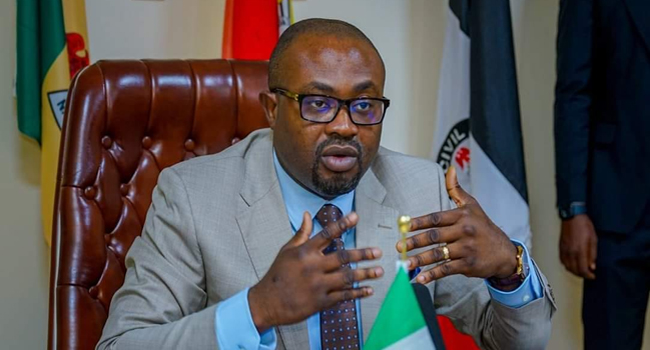By John Ogunsemore
The Minister of Interior, Dr. Olubunmi Tunji-Ojo said Nigeria is not a helpless nation and will not tolerate disrespect of its sovereignty and dignity.
Tunji-Ojo stated this during a high-level engagement with the International Organisation for Migration (IOM) and other key stakeholders in Abuja, according to a statement by the Director, Press & Public Relations of the ministry, Ozoya Imohimi.
The minister expressed grave concern regarding a recent IOM-facilitated workshop that proceeded without consultation or involvement from the Nigerian Immigration Service or the ministry.
He said that the workshop was funded by a foreign ministry, touched on national security matters, prompting the minister to denounce it as a “gross violation of our sovereign rights”.
“We are not helpless. We welcome collaboration, but support must respect Nigeria’s sovereignty and dignity,” the minister asserted.
Tunji-Ojo affirmed government’s unwavering commitment to strategic, secure, and technologically advanced border management, while emphasising Nigeria’s evolving identity as more than just a nation but a beacon of innovation, opportunity, and hospitality for all.
“Nigeria is a nation of hope not just for Nigerians but for the global community. We are proud to host you and assure you of our peace loving, innovative people and our full cooperation in all migration related initiatives,” he stated.
Highlighting the government’s top priorities, the minister stressed that border control remains a national focus.
“A safe border is a secure nation. Without proper border management, we cannot ensure the safety of our people,” he said.
The minister said significant progress has been made in the completion of Phase One of Nigeria’s e-Border Surveillance System, with plans underway to extend real-time monitoring across all 4,047 km of the nation’s borders.
Tunji-Ojo explained that the government has enhanced Nigeria’s sovereign travel document, aligning it with global best practices.
He added that the government has also launched a digitalised landing and exit card system, as of May 1 across air, land, and maritime borders with e-Visa platform, providing applicants with a simplified process within 48 hours, thereby boosting economic activity through increased accessibility.
Tunji-Ojo stressed that government has stablished a centralised information management system to integrate visa, passenger, and security data for cross-referencing and national security enhancement with the implementation of Advance Passenger Information (API) systems, with future upgrades planned to transition to interactive API (iAPI) capabilities.
The minister made it clear that any engagement on national security issues must include relevant Nigerian authorities and reflect mutual respect.
Responding, the IOM Nigeria Chief of Mission, Ms. Dimanche Sharon, offered heartfelt gratitude for the minister’s candid remarks and the warm welcome to Nigeria.
Sharing her personal experience of moving from Kenya to Nigeria, she praised the country’s remarkable spirit, creativity, and untold stories of innovation.
“I am proud to call Nigeria home. I believe in telling a new story of Nigeria—the real story,” she said.
Sharon expressed IOM’s readiness to continue working in partnership with Nigerian authorities in line with three strategic priorities including saving lives and protecting vulnerable populations, driving solutions to displacement, and facilitating regular migration pathways, including efforts around digital transformation and border governance.
The dialogue was used to buttress a mutual reaffirmation of the need for stronger collaboration, greater transparency, and sovereign respect in all migration and border security initiatives.

